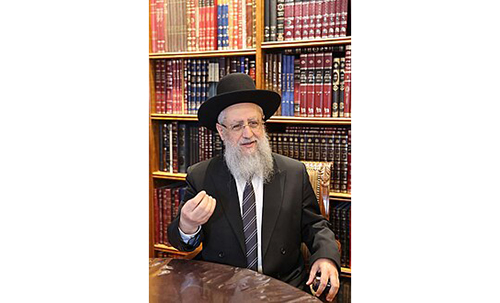|
Getting your Trinity Audio player ready...
|
Edited by: Fern Sidman
Israel’s Shin Bet security agency has implemented heightened protective measures for Sephardic Chief Rabbi David Yosef following credible threats from terrorist organizations. According to a recently published report on the Vois Es Nais web site, the decision reflects growing concerns about the safety of high-profile religious and political figures amid rising regional tensions and an increasingly volatile security landscape.
The decision to increase security for Rabbi Yosef comes at a time of heightened instability in the region, with extremist factions actively seeking to target symbolic and influential figures. Such threats are not isolated incidents but part of a broader pattern wherein religious and political leaders are seen as high-value targets by terrorist organizations. These groups aim not only to instill fear but also to disrupt societal and religious cohesion within Israel.
The Shin Bet, Israel’s premier internal security agency, has long been vigilant in identifying and neutralizing threats against public figures. VIN News reported that in the case of Rabbi Yosef, intelligence indicated credible and actionable threats, warranting immediate protective measures. While the exact nature of these threats remains classified, sources suggest they may involve planned attacks aimed at undermining both public morale and institutional stability.
Following an in-depth risk assessment, the Shin Bet instructed the Religious Services Ministry to enhance Rabbi Yosef’s security apparatus significantly. This includes Rabbi Yosef now be accompanied by an expanded team of highly trained personal security officers as well as the employment of state-of-the-art surveillance technology that will monitor movements and detect potential threats in real-time. In addition, the security apparatus includes enhanced protocols for Rabbi Yosef’s travel, including secure vehicles and pre-vetted travel routes as well as limitations on public accessibility to the rabbi’s offices, residence, and other frequently visited locations.
On Saturday, senior security officials met directly with Rabbi Yosef to brief him on the threats and outline the updated safety protocols. The meeting was described as both comprehensive and urgent, reflecting the severity of the intelligence gathered.
As the Sephardic Chief Rabbi, David Yosef holds a position of immense religious and cultural influence within Israel and among Jewish communities worldwide. His role extends beyond spiritual guidance—it encompasses social leadership, cultural preservation, and fostering unity within Israel’s diverse population.
Rabbi Yosef is also the son of the late Rabbi Ovadia Yosef, one of the most revered Sephardic spiritual leaders in modern Jewish history. The Yosef family carries a legacy deeply intertwined with Israel’s religious and social fabric, making Rabbi David Yosef a symbolic figure whose safety is paramount.
The threats against Rabbi Yosef must be viewed in the context of escalating tensions in the region. Recent surges in violence, both in Jerusalem and other hotspots, have heightened fears of widespread unrest. Extremist factions, both domestic and external, have shown an increasing willingness to target individuals perceived as key symbols of authority and national identity.
These tensions have been fueled by a combination of political stalemates, territorial disputes, and inflammatory rhetoric from radical groups. Public figures, particularly those representing state institutions or religious leadership, remain vulnerable to targeted attacks aimed at destabilizing the status quo.
The Shin Bet’s intervention in Rabbi Yosef’s security aligns with a broader strategy to safeguard Israel’s leadership class against asymmetric threats. Over the years, the agency has developed a sophisticated model for protecting high-profile figures, blending advanced technology, intelligence gathering, and human expertise.
Key pillars of this strategy include detecting and neutralizing threats before they materialize, adjusting security measures based on evolving threat assessments and ensuring the public understands and cooperates with heightened security measures when required.





